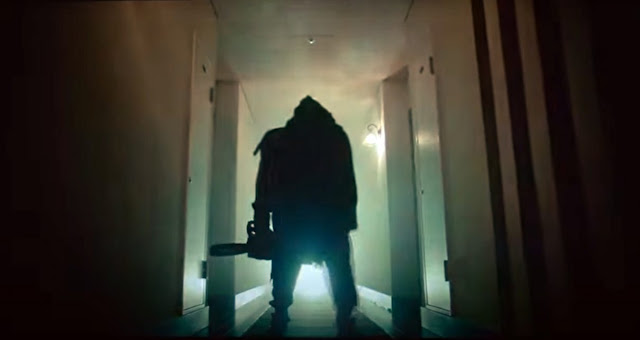Review by Matt S.
Note: I’m writing this upfront and in advance; there are spoilers in this review. The game itself has a little clip at the start asking that people don’t spoil the experience, but it’s absolutely impossible to talk about this game without discussing plot points. And let’s be clear here. This game doesn’t have a Sixth Sense-like twist such that knowing it in advance would ruin the experience for you. In fact, for a game that bears a strong tonal resonance similar to Christopher Nolan’s classic film, Memento, it’s a little strange that the developer would want to undermine their work by framing it as a narrative of cheap twists that can be “spoiled.” Nonetheless, if you’re not interested in reading a discussion of a narrative game’s narrative before playing the game, this paragraph right here is the warning I’m giving you to absolve myself from feeling any guilt if you feel like I’ve “ruined” the game on you.
Kodaka Kazutaka is a unique talent in the games industry, in that he’s able to take a variety of fairly simple thriller/mystery concepts and spin them into stories and experiences that stay with you well after you’ve finished playing. A senior creative on Clock Tower 3 (to this day the most intellectually fascinating stalker horror game), Kodaka then penned the scenarios for a pile of Jake Hunter titles, before stamping himself on the industry with the endlessly stylish, vividly intellectual Danganronpa series. Now, with Death Come True, Kodaka has played with the FMV genre to craft a highly tuned noirish thriller that features one truly poignant decision to make right at the end.
The story follows Karaki Makoto, played by Hongō Kongo. Karaki wakes up in a (rather lavish) hotel with no memory whatsoever, but quickly discovers a passed out girl in his bath (played by Kuriyama Chiaki), and there’s a police officer wrapping on his door. Worse, that’s just the start of his troubles. He’s soon to discover that he’s apparently a serial killer, the girl – Sachimura Akane – is actually a detective after him, and there’s a Jason Voorhees-like monster that is prowling the corridors looking for the two of them.
With all of that conflict going on, you’d think it would be hard for Karaki to survive and… well, that’s exactly the point. Within the first couple of minutes, Karaki experiences his first death, only to wake up right back at the start of the story, in his bed, with time having rewound but having remembered what happened in previous cycles. From there, he starts trying to unravel the mystery. Because this is an FMV game, there’s not much for players to do other than make some basic choose-your-own-adventure decisions along the way, but thanks to the pacing, quality performances from the entire cast (and this game does have genuine star power as far as Japan’s film and television industry goes), and intriguing narrative, you’ll be fully invested anyway.
It’s actually odd just how closely Death Come True parrots some of the key themes across the Danganronpa series, suggesting that Kodaka has some unfinished thoughts with that series that he wanted to take another look at (and again we are going to get very spoiler-y from this point on). The idea of the truth coming from confronting mortality was a core concept in Danganronpa, and it plays a similar, albeit more personal role here. In Danganronpa the protagonist would learn of his or her forgotten past, and the mystery itself, through the literal trials and executions that were meted out. In Death Come True Karaki himself needs to put himself through mortal, physical and emotional trials, including suicide, in order to uncover memories and slowly start to understand what is really going on in this world.
This leads on to another core motif of Kodaka’s recent output; the idea of exploring the nature of humanity through an intellectual, dispassionate simulation removed from reality. Whether it’s the Danganronpa’s approach of removing a class of school mates from the real world to drop them into a panopticon-like “manufactured utopia” to delve into human interaction within the context of Battle Royale-like death games, or the actual simulation of Danganronpa 2, Kodaka likes contextualising the human experience and what motivates people into the actions that they take through game-based hypotheticals. Death Come True proves to similar, and that’s why that final decision that I mentioned at the start is so poignant. It’s a powerful hypothetical in which neither answer is right or wrong, and both can easily be argued to be a “happy ending”. It’s also a step beyond the Danganronpa series in the sense that in those games have absolutely no agency, and it’s a moment that is very carefully choreographed to make you really think about the response you’d take. Such is the impact that, even though the game itself is only an hour or so in length to get to that point (and thus I knew that I could easily just play through again to get to that point), and there’s a timer ticking down to force you to think fast, I still used up every moment trying to ponder through just where I sat.
Death Come True also does some really clever things to make you doubt everything that’s going on around you… and to, again, encourage you to think about the implications of it all. With every death, you’re given the option to “Continue” or “End”, with “Continue” winding the plot back a ways to allow you to make a different decision (or, possibly, starting the narrative again and giving you the option of making different choices). “End,” meanwhile, deletes the save and returns you to the title screen, and while the game actively encourages you to use that option, it’s also a brilliant red herring if you do what the game’s asking – the consequences for not doing as the game requests are not the actual consequences, and it’s all an impressive effort to throw you off the scent. Kodaka would seem to be quite the fan of more classic noir and mystery stories, because this is the kind of reader expectation subversion that you would expect of likes of Doyle, Christie or Chandler at their most devious.
There’s also a character in the game that exists exclusively as a narrative red herring. She shows up early and has all the trappings of a major character, but plays no role in any of the major revelations within the game. You can almost imagine the glee that Kodaka must have had in writing this character specifically to throw players off. In general, the writing is spot-on for the minimalist mystery thriller that it’s presenting. It’s something that is actually quite common to Japan’s film and television industries, and while I think that tonally there’s stuff in this game that doesn’t necessarily translate, the noirish vibe should help to engage players less familiar with the cultural context that this game exists within.
One final note I wanted to mention; if you choose one particular ending, you’ll watch something completely familiar to fans of the original Danganronpa. Kodaka loves the “the ending is a beginning and a brave step into the unknown,” solution to the abject misery that he likes to weave through his stories. As bright, quirky and vibrant as Kodaka’s sense of aesthetics can be, the actual themes of his games generally leave a dark impression on humanity as a collective, and having the promise – if unknown and uncertain – of a future beyond the curtain is exactly the right note to finish on. In this case it’s an interesting contrast to the other ending, which I can only describe as a hollow sense of the status quo being upheld, and so while neither ending is a “bad” or “incorrect” ending, I would suggest that Kodaka’s pinning his hopes on humanity taking the risk… and I would be fascinated to know the data on which of the two choices is the more common.
Death Come True is, ultimately, a story of romanticism set against a pragmatic realism. This review will make a lot more sense after you’ve actually played the game, and I’m certainly hoping that there will be people that jump on here down the track to discuss their interpretation of events with me. If Danganronpa argued that Kodaka is one of the genuine thinkers around video game narrative, Death Come True has solidified it, and while this is a much more modest and experimental work in scope to that visual novel series, it’s still inspired stuff and it does have a haunting quality that will remain with me for quite some time to come.
– Matt S.
Editor-in-Chief
Find me on Twitter: @mattsainsb
The critic has purchased a copy of this game for the purposes of review.











